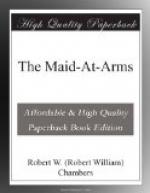“Thanks, uncle,” I said, touched to the quick. “These gentlemen are not fools, and only a fool could dream an Ormond coward.”
“Ay, a fool!” cried Walter Butler. “I am an Ormond! There is no cowardice in the blood. He shall have his own time; he is an Ormond!”
Dorothy Varick raised her bare, white arm and pointed straight at Walter Butler. “See that your sword remains unspotted, sir,” she said, in a clear voice. “For if you hire the Iroquois to do your work you stand dishonored, and no true man will meet you on the field you forfeit!”
“What’s that?” cried Sir John, astonished, and Sir George Covert cried:
“Brava! Bravissima! There speaks the Ormond through the Varick!”
Walter Butler leaned forward, staring at me. “You refuse to meet me if I use our Mohawks?”
And Dorothy, her voice trembling a little, picked up the word from his grinning teeth. “Mohawks understand the word ‘honor’ better than do you, Captain Butler, if you are found fighting in their ranks!”
She laid her hand on my arm, still facing him.
“My cousin shall not cross blade with a soiled blade! He dare not—if only for my own poor honor’s sake!”
Then Colonel Claus rose, thumping violently on the table, and, “Here’s a pretty rumpus!” he bawled, “with all right and all wrong, and nobody to snuff out the spreading flame, but every one a-flinging tallow in a fire we all may rue! My God! Are we not all kinsmen here, gathered to decent council how best to save our bacon in this pot a-boiling over? If Mr. Ormond and Captain Butler must tickle sword-points one day, that is no cause for dolorous looks or hot words—no! Rather is it a family trick, a good, old-fashioned game that all boys play, and no harm, either. Have I not played it, too? Has any gentleman present not pinked or been pinked on that debatable land we call the field of honor? Come, kinsmen, we have all had too much wine—or too little.”
“Too little!” protested Captain Campbell, with a forced laugh; and Betty Austin loosed her tongue for the first time to cry out that her mouth was parched wi’ swallowing so many words all piping-hot. Whereat one or two laughed, and Colonel John Butler said:
Neither Mr. Ormond nor Sir George Covert are rebels. They differ from us in this matter touching on the Iroquois. If they think we soil our hands with war-paint, let them keep their own wristbands clean, but fight for their King as sturdily as shall we this time next month.”
“That is a very pleasant view to take,” observed Sir George, with a smile.
“A sensible view,” suggested Campbell.
“Amiable,” said Sir George, blandly.
“Oh, let us fill to the family!” broke in McDonald, impatiently. “It’s dry work cursing your friends! Fill up, Campbell, and I’ll forget Glencoe ... while I’m drinking.”
“Mr. Ormond,” said Walter Butler, in a low voice, “I cannot credit ill of a man of your name. You are young and hot-blooded, and you perhaps lack as yet a capacity for reflection. I shall look for you among us when the time comes. No Ormond can desert his King.”




